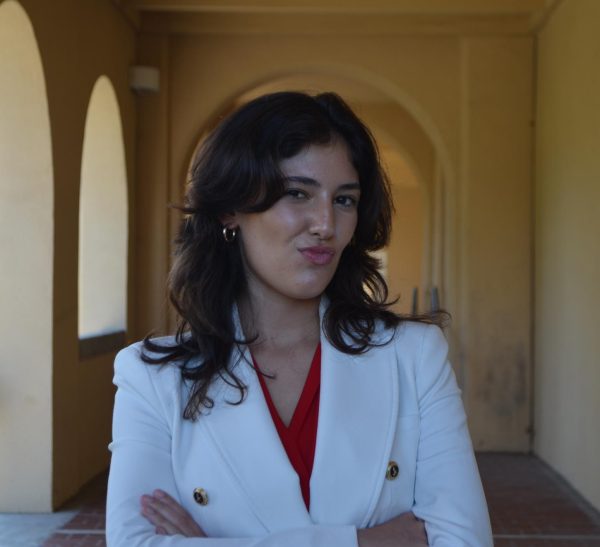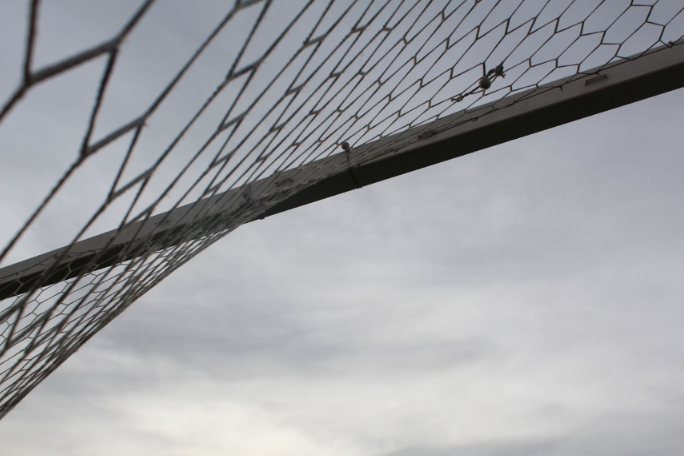How Did the “Beautiful Game” Get So Bloody?
A 2022 World Cup Retrospective
While the Qatar World Cup cemented its legacy as a tournament of surprises, it remains an event that caused pain and loss to thousands (Photography by: Sienna Schoales).
Trigger Warning: Suicide is briefly discussed in the article.
Lighting a funeral pyre sets off the transition between life and death, with fire burning away ties harboring the soul to earthly existence. In Nepali funeral tradition, the deceased’s eldest son must light the pyre, a generational right passed down from father to son. Thirteen-month-old Sushant, too young to hold the lighting stick without his grandfather’s help, cremated his father in November. Sushant’s dad, Umesh Kumar Yadav, was one of the 1,641 Nepali migrant workers killed during the construction of the 2022 Qatar World Cup stadiums. Despite the International Association Football Federation’s (FIFA) denial and a 180 million dollar promotion deal with English legend David Beckham, the deaths of over 6,500 migrant workers have been made public in the months leading up to and following the tournament.
Qatar’s relationship with the World Cup has been shrouded in controversy since the small nation won its hosting bid in 2010—officially becoming the first Middle Eastern host in the competition’s history. Given that Qatar’s average summer weather pushes 106 degrees Fahrenheit, clashing with the historic summer-time tournament, suspicions toward Qatar’s hosting rights began long before an internal investigation. As a country of fewer than 3 million people, Qatar only had one World Cup capacity stadium (Khalifa International) at the time of their miraculous winning bid. (They would go on to build several more in the years to come). Though FIFA rejects accusations of malpractice, the United States Department of Justice charged 25 FIFA executives with “the corruption of international soccer” in 2015—breaking the illusion of fair play within FIFA tournaments.
Fans of the sport and HBHS faculty members Mr. Bourne, Señorita Acuña, and Coach Sean Dick disclosed their thoughts regarding Qatar’s business practices and the subsequent backlash surrounding the tournament.
HBHS Boys Varsity Soccer Coach Sean Dick said, “My World Cup knowledge prior to the start of the World Cup was that my hope was that it was not going to be played in the desert in the summer and I was happy when it got moved.”
On a more critical note, Coach Dick followed with, “If there were human rights abuses, there has to be an investigation and hopefully a resolution.”
Spanish teacher and Ronaldo connoisseur Señorita Acuña enjoys the tournament for its ability to unite people across the globe and on a smaller scale, like the HBHS student community. “Football is my favorite sport, I enjoy the competitive aspect and also the camaraderie. It was extra special this year watching the games in class with students,” she said.
International non-governmental organization Amnesty International conducted a report to question Qatar’s World Cup preparation. Released in November 2013, the global organization interviewed migrant workers from twenty separate labor camps; ranging from the manufacturing Industrial Area to Krantz Al-Khor engineering sites. What Amnesty International found revealed more than simple unprofessionalism in Qatari business but the rampant dehumanization of migrant laborers.
Employees of Krantz engineering, primarily from India, Nepal, and Sri Lanka, had gotten used to their salaries arriving late (or not at all) by mid-2012.
One Indian employee stated, “You might get paid a month later, or two months late,” before piling on “or you were paid two months late, but you only received one of the months you were owed.” The crisis at Kranz Al-Kohr only worsened in 2013 as employees waited on paychecks that never came.
More than 70 workers opted to return home without their salaries, a task that would prove nearly impossible since 90% of Qatari businesses—a harrowing statistic disclosed by Amnesty International—possessed their migrant employees’ passports. Along with this, several men revealed their intentions of suicide in the upcoming months during Amnesty International’s visits to Al-Kohr in 2013.
How can a small nation whose workforce is 95% foreign bring the majority down to the point of suicide? Qatar’s migrant business model, the Kafala System, creates an environment in which executives have absolute control over their employees. Kafala is used within other nations Qatar is regionally associated with, such as Kuwait, Saudi Arabia, and Jordan.
The Kafala System allows businesses to “sponsor” foreign workers by paying for their travel and accommodation. Since employers provide transportation, housing, and money to migrant workers (and are viewed as private citizens under the Kafala system), they are given control over their employee’s ability to transfer jobs, terminate contracts, and leave their sponsored nation. Incidents, like the one seen at Kranz Engineering, are possible due to Kafala sponsors operating outside national labor laws. The Council of Foreign Relations points out risks workers face under the Kafala system, including COVID-19 due to crowded living conditions, confiscation of their visas and phones, debt from withheld wages, and forced labor.
Qatar was paid more international attention due to its status as a future World Cup host. Reforms involving the “most problematic aspects of the Kafala,” as stated by the International Labour Organization, were made from 2018 to 2020. Qatar adopted a monthly minimum wage of $275, intensified the punishment for employers that withhold wages, and gave workers freedom over their job transfers.
The changes to Kafala are necessary, commendable even, but no policy change absolves FIFA and Qatar of the suffering they have brought upon thousands of migrants who completed 10-hour work days on the Al-Rayyan stadium in 107-degree heat. The stadium saw Belgium’s aging “golden generation” exit in the group stage, one of the competition’s biggest shockers. However, Al-Rayyan was built by those who would not share the victory or joy found in the 2022 World Cup.
When asked if Qatar’s human rights abuses affected the way he felt as a viewer, Mr. Bourne a Huntington Beach High School (HBHS) United States History and Government teacher said, “Oh one hundred percent. The love of the game, and especially support[ing] the [United States] was one thing. But then whenever they were talking about the stadiums, it was very hard for me…but it wasn’t enough for me to turn it off.”
Bourne is involved with Major League Soccer team Los Angeles Football Club (LAFC). As someone who observes the inner workings of a professional soccer team, Bourne believes that transparency is key to ensuring that no parties are taken advantage of. “I think [FIFA] need to go through a painstaking reorganization to the point where the types of money that were being thrown around don’t get thrown around as much. The finances of the individuals and the organization should be tracked [and] publicly reported,” Bourne commented in regards to possible FIFA reform.
When discussing the criticism Qatar faces, HBHS Spanish teacher believes that the world does not get closer to progress when nations criticize one another without addressing their own human rights issues. “I was actually annoyed that many people spoke out about this before acknowledging what is happening here in the United States. Many people suffer from violation of their own human rights here and the way the US treats immigrants is also very inhumane,” Acuña said.
For fans who grew up alongside El Clasico rivalries featuring prime players such as Messi and Ronaldo, the tournament was the last chance at glory for many childhood heroes. German international staples such as Manuel Nauer and Thomas Müller, Croatian midfielder sensation Luka Modić, and Uruguayan talisman Luís Suarez famous for handball and biting other players, have likely played their final World Cup. As players whose images have spent the last fifteen years taped to the walls of admirers worldwide conclude their careers, 2022 saw the thrilling rise of young talent on the world stage. Teenage English star Jude Bellingham, Moroccan defender Achraf Hakimi, Argentine attackers Enzo Fernandez and Julian Alvarez, and—of course—France’s electric Kylian Mbappé gave a promising insight into international soccer’s future.
The World Cup holds more power than any other competition. It defines legacies, it can bolster national pride or embarrassment across a population. FIFA and Qatar have weaponized the tournament through negligence and greed. It is disheartening for a competition designed to bring entertainment and unity to have an underbelly of suffering and extortion.
As put best by Acuña, “Like many huge organizations, money talks.”
Your donation will support the student journalists of Huntington Beach High School. Your contribution will allow us to cover our annual website hosting costs.
Thank you for supporting our program!



